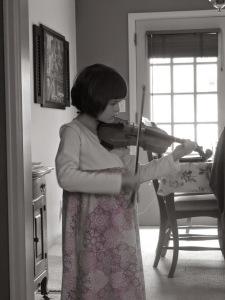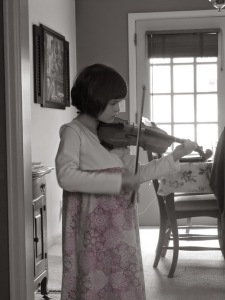
If you're a beginning writer, and have been discouraged by the stuff that's been dribbling from your proverbial pen, allow me to share some really great news with you. If you can understand this now, and really internalize it, it will help you more than you can imagine. This will set you apart. Writing is hard. "Right," you're saying. "Enough with the preamble, already. So what's the good news?"
Writing is hard.
That's the good news. The good news, dear writer, is that the words on your page do not disappoint you because you have no talent, but because writing----good writing----is hard work. And this is good news (I'm not kidding) because it means that if you work hard, consistently and over time, you'll improve. I promise. [Tweet "Writing is hard. That's the good news."] The process of writing my first novel, Wedded to War, had a lot in common with my 8-year-old daughter's Suzuki violin method:
- Before she drew her bow across her strings for the first time, she listened to her CD of music that she'd be playing. The parallel in writing, of course, is that we must read good books. It is non-negotiable. This should also make you quite happy. ;)
- The music book of instruction is also indispensable for my daughter. It doesn't just have songs, but diagrams showing posture and techniques. When I first launched into fiction writing, I bought pretty much every variation of "how to write a novel" that my local Barnes & Noble carried. I asked my favorite authors which craft books they recommended, and I bought and read those, too. (I still go back to them with every novel I've written since.)
- My equivalent of a music teacher was that I hired a book coach to help me make course corrections as needed. The next two novels I wrote, I hired My Book Therapy to just help me hash out my outline, and then I took it from there.
- The really hard work, for both violin and writing, is the actual practice. And believe me, my first draft(s) had much in common with the dying-cat sounds of a beginning violin student. I never felt like I got the book "just right." In fact, when Wedded to War was in the galleys stage (when it's printed for proofing), I requested sixteen hundred more changes. (My editors ignored most of the requests.)
- Last, hard work pays off. Wedded to War was a Christy Award finalist in both the First Novel and Historical Fiction categories and won the gold medal in Historical Fiction from the Military Writers Society of America. I tell you this not to say that I am talented, but to say discipline works. Even those who are born with musical ability cannot just pick up the violin and play Bach perfectly. Neither can we writers expect to get it right without putting in the work. Moreover, if you go through a phase of not writing for a while, and you try again only to discover you're writing disappoints you, take heart. It's not that you've lost your talent. It's just that you're out of practice. I get rusty, too. The best remedy is to keep at it.
The ratio of talent to discipline among those who write well is surprisingly skewed toward discipline. Someone very wise once said that writing well is a matter of 10 percent talent and 90 percent discipline (read: constipated first drafts, gut-wrenching revisions, writing without a muse, etc.). This means that it's not enough to have an innate gift for storytelling. It also means (this is the good part) that those of us who are willing to work hard at it can succeed. Now, when I say "succeed" I'm not saying "get published," although that often comes along with it. To succeed, in my estimation, is to write something truly worth publishing. Make writing well your first goal. Seek publication, if you like, after you seek to hone your craft. [Tweet "To succeed is to write something truly worth publishing."] I was so encouraged by the following clip from Ira Glass (of NPR's This American Life), and I hope that you will be too.
Don't you love that? What you're going through (and what I still go through as multi-published author) is totally normal.
Do a lot of work. Fight your way through it. It will get better.
Now, get to writing, writer! *Related: On Writing, and In Praise of the Crummy First Draft: 5 Things It Does For Us You may also like: Follow Jocelyn's board The Art and Science of Writing on Pinterest.


Comments
Add new comment